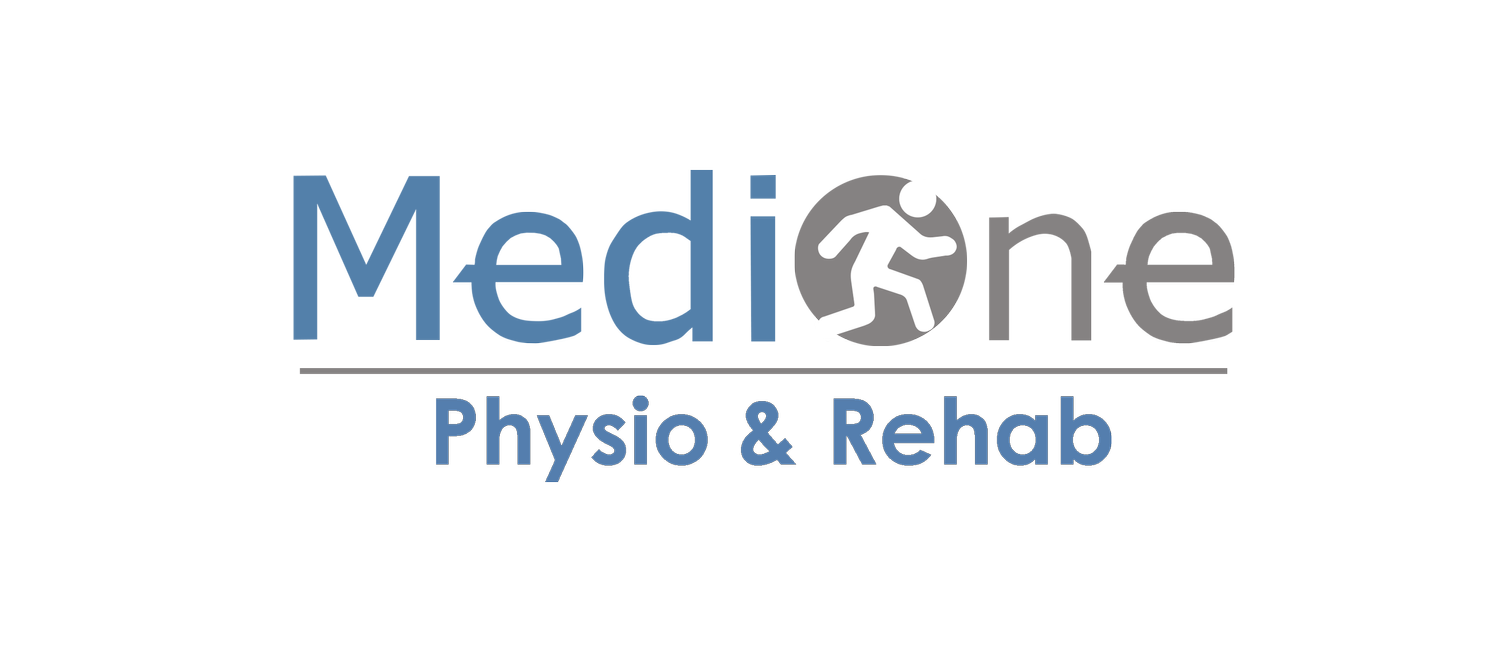Integrative Strategies for Managing Anxiety & Stress
Anxiety and stress are among the most prevalent health concerns globally, affecting both mental well-being and physical health. These conditions can contribute to cardiovascular issues, weakened immunity, and reduced quality of life (Chand et al., 2020). While conventional treatments such as medication and psychotherapy are effective, integrative approaches that combine these with complementary therapies offer additional benefits (Sarris et al., 2014). At MediOne Physio & Rehab, our approach blends the best of conventional and holistic methods to address both symptoms and underlying causes.
Mindfulness & Breathing Techniques
Mindfulness meditation has been found to reduce symptoms of anxiety and depression while lowering physiological stress markers, including cortisol levels (Pascoe et al., 2017). Structured breathing exercises such as diaphragmatic breathing and box breathing activate the parasympathetic nervous system, which helps regulate the stress response (Ma et al., 2017). Incorporating these into daily routines — even for short periods — can improve mood regulation and reduce muscle tension.
Nutrition & Lifestyle Support
Nutrition plays a crucial role in emotional regulation. Diets rich in omega-3 fatty acids have been associated with lower rates of mood disorders and anxiety (Grosso et al., 2014). Conversely, diets high in refined sugar and processed foods are linked to higher stress reactivity (Jacka et al., 2010). Regular exercise and adequate sleep are equally important, with evidence showing that both improve resilience to stress (Huang et al., 2013; Meerlo et al., 2008). Spending time in nature also reduces perceived stress and enhances mood (Bratman et al., 2015). At MediOne Physio & Rehab, our Naturopathic Doctor and Dietician can elaborate in further detail about the benefits of a healthy balance diet and lifestyle.
Acupuncture and Manual Techniques
Acupuncture performed by a Traditional Chinese Medicine Acupuncturist or Naturopathic Doctor has demonstrated positive effects in managing anxiety by influencing neurotransmitters and regulating the autonomic nervous system (Amorim et al., 2018). Manual therapies such as massage, chiropractic care, and osteopathy help relieve muscle tension, improve posture, and promote circulation, further supporting mental well-being (Field, 2016). Combining these approaches can enhance treatment outcomes by addressing both the physiological and psychological aspects of stress.
Integrative strategies for managing anxiety and stress provide a comprehensive framework for long-term wellness. By incorporating mindfulness, nutritional optimization, lifestyle improvements, and therapeutic interventions, patients can develop greater emotional resilience and improved overall health (Sarris et al., 2014).
References
Amorim, D., Amado, J., Brito, I., Fiuza, S. M., Amorim, N., Costeira, C., ... & Machado, J. (2018). Acupuncture and electroacupuncture for anxiety disorders: A systematic review of the clinical research. Complementary Therapies in Clinical Practice, 31, 31–37. https://doi.org/10.1016/j.ctcp.2018.01.008
Bratman, G. N., Hamilton, J. P., Hahn, K. S., Daily, G. C., & Gross, J. J. (2015). Nature experience reduces rumination and subgenual prefrontal cortex activation. PNAS, 112(28), 8567–8572. https://doi.org/10.1073/pnas.1510459112
Chand, S. P., Marwaha, R., & Wajid, N. (2020). Anxiety disorders. StatPearls Publishing.
Field, T. (2016). Massage therapy research review. Complementary Therapies in Clinical Practice, 24, 19–31. https://doi.org/10.1016/j.ctcp.2016.04.005
Grosso, G., Pajak, A., Marventano, S., Castellano, S., Galvano, F., Bucolo, C., & Drago, F. (2014). Role of omega-3 fatty acids in the treatment of depressive disorders: A comprehensive meta-analysis of randomized clinical trials. PLoS ONE, 9(5), e96905. https://doi.org/10.1371/journal.pone.0096905
Huang, C. J., Webb, H. E., Zourdos, M. C., & Acevedo, E. O. (2013). Cardiovascular reactivity, stress, and physical activity. Frontiers in Physiology, 4, 314. https://doi.org/10.3389/fphys.2013.00314
Jacka, F. N., Pasco, J. A., Mykletun, A., Williams, L. J., Hodge, A. M., O’Reilly, S. L., & Berk, M. (2010). Association of Western and traditional diets with depression and anxiety in women. American Journal of Psychiatry, 167(3), 305–311. https://doi.org/10.1176/appi.ajp.2009.09060881
Ma, X., Yue, Z. Q., Gong, Z. Q., Zhang, H., Duan, N. Y., Shi, Y. T., ... & Li, Y. F. (2017). The effect of diaphragmatic breathing on attention, negative affect and stress in healthy adults. Frontiers in Psychology, 8, 874. https://doi.org/10.3389/fpsyg.2017.00874
Meerlo, P., Sgoifo, A., & Suchecki, D. (2008). Restricted and disrupted sleep: Effects on autonomic function, neuroendocrine stress systems and stress responsivity. Sleep Medicine Reviews, 12(3), 197–210. https://doi.org/10.1016/j.smrv.2007.07.007
Pascoe, M. C., Thompson, D. R., & Ski, C. F. (2017). Yoga, mindfulness-based stress reduction and stress-related physiological measures: A meta-analysis. Psychoneuroendocrinology, 86, 152–168. https://doi.org/10.1016/j.psyneuen.2017.08.008
Sarris, J., O'Neil, A., Coulson, C. E., Schweitzer, I., & Berk, M. (2014). Lifestyle medicine for depression. BMC Psychiatry, 14, 107. https://doi.org/10.1186/1471-244X-14-107






